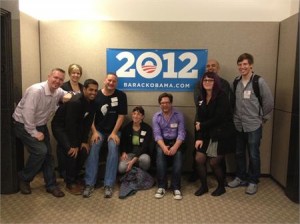Redemption at the Polls: Obama’s 2012 re-election, 80s Identity Politics and the Tipping Point
A lot of geek prayers were answered recently through geek statistical analysis by Nate Silver. He accurately predicted almost all the US election results and was dismissed for it by the Right, for his bewitching use of math because “Nobody knows anything.”
Nate Silver is a statistician taking on the job done before by pundits and experts who have been around the game a long time. He is quiet and nerdy and he bested them all. It’s exactly the story told in Moneyball (which is a great movie and an amazing book by Michael Lewis).
I was lucky to get a nerdy tour of Obama’s campaign headquarters when I was speaking at WebVisions in Chicago in October. (Many thanks to them for the tour and the above pic). Some of the people in our group who worked in UX (or user experience design) knew the Obama campaign’s head of UX. Obama’s HQ was full of old computer monitors propped on cardboard boxes for ergonomic help. There were huge numbers of young people editing video, designing sites, coding, making calls and designing all manner of posters which were all center justified and beautifully fonted (yes I made that word up and I like it). The posters and youthful environment felt like a Pride Parade organized by McSweeney’s smushed with a tech start up: Asian American Pacific Islanders for Obama, African Americans for Obama, LGBT Americans for Obama and so on.
It was a room full of true believers who were working their asses off. It reminded me of my brother who is an intense campaigner (he helped Canada’s Green Party leader Elizabeth May get elected and now runs Change.org campaigns in Canada) and it reminded me of myself in college and law school when I organized and worked fervently on feminist and progressive causes. I attended a rally for Jesse Jackson’s “Rainbow Coalition” back in the 80s when he ran for the Democratic nomination and it was dismissed as a political stunt and far-off, utopianism among naive students and wacko liberals. And it was easy to dismiss. The rally wasn’t very big, the speeches weren’t well-organized or confident and the most notable moment was one of my few out classmates throwing her bra onstage for the Indigo Girls. It was 1988. All of these different groups working together? They couldn’t stop arguing and all they wanted to do was compare their pain and oppression. A bunch of whiners.
Fast forward 24 years to last Tuesday and I’m at my nerd friends with a bunch of nerdy people of various races and sexualities and genders, many of whom work at tech start-ups and we’re taking photographs with our pocket computers of the High Definition television set of the results of incredibly well-organized, disciplined, grass roots campaign which had as its basic premise the reality that enough of us from all the hyphenated groups would matter and are of voting age that you could have enough votes to re-elect a Black and White President who supports the right to equal marriage.
And all 4 states with votes on gay marriage supported marriage equality.
And the first openly gay senator was elected. And the first Asian American woman senator.
And every politician who made insane comments about rape was defeated.
And the demographics show that the tipping point has happened. The electorate has moved toward amore diverse population and inclusive policies.
I’ve been waiting for this moment for the wake up call about the human cost of the “trickle down” economics and the playing to the religious right since Reagan, since I was a university student at Yale. That’s when identity politics was being mocked as official whining and it launched the career of many a disdainful, pithy writer (Katie Roiphe, Camille Paglia, Dinesh D’Souza I’m looking at you). And yeah the worst part of identity politics was and is the idea that feeling aggrieved is what you should lead with instead of what motivates you to lead. It took me many years to find that the theory you have about the world is just a feeling you have about your parents.
The best part of political correctness is the idea of consideration and respect for others who are different than you. The best part of identity politics is the notion that the reality of your lived experience informs your understanding of public needs and effective solutions.
And to have the best from these things combined with incredibly nerdy attention to detail and excitement about connecting with people is to re-elect Barak Obama.
To focus not only on what hurts, but to feel and acknowledge what hurts and then focussing on what *can* be done. This inspires me.
